January 12, 2021
On the surface, baseball is pretty much the same game wherever it’s played. But where it’s played is often a whole new ballgame.
And therein lies the challenge for the players, coaches and others who go outside their home countries to work. Succeeding elsewhere involves more than ability and knowledge. To survive and thrive, one must adapt to all manner of cultural differences and approaches to the game. The rules may be mostly the same, but the game often is not. And the environment is almost always not.
The experience can be very successful, meaningful and rewarding. It can also be disappointing. Certainly, it’s important to produce on the field, but how one deals with it all – the different, the funny, the confusing, the maddening, the weird – is a major factor determining success or failure.
Talk to anyone who has been involved in baseball overseas, and you’ll consistently hear advice such as “be flexible”, “go with the flow” and “do what the others do”. To put it another way, you go along to get along.
“If you learn the game and the culture, you’ll be all right,” said Craig Brazell, who split seven seasons in Japan between the Hanshin Tigers and Chiba Lotte Marines. “If you’re productive and respectful, you’ll be fine.”
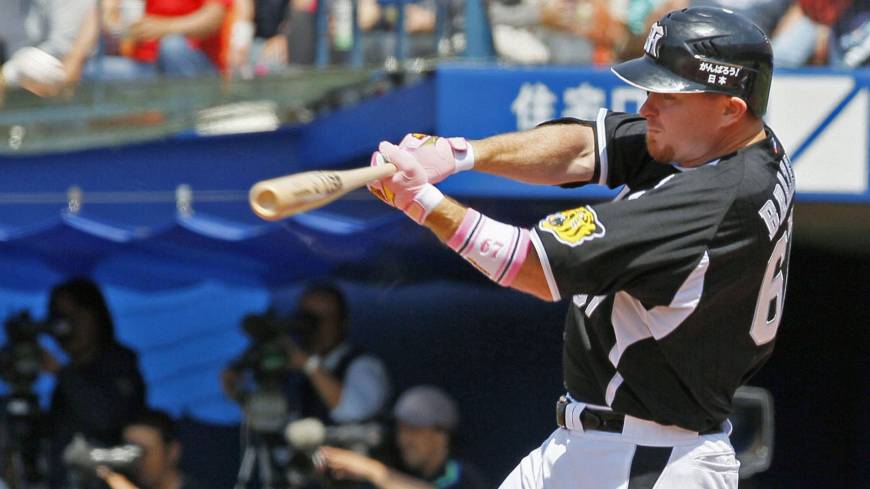
Brazell with the Hanshin Tigers
Carlos Mirabal, an American who pitched in Taiwan and Japan, said, “My attitude was always to go along and learn new things. You have to be a good player, but you also have to have an open mind to make it in other countries. When the Japanese come to the U.S. to scout players, the first thing they look for is how open-minded the guys are. In my experience, guys who weren’t that way didn’t last long.”
Arik Sikula learned that early. An American, he pitched in the Toronto Blue Jays organization and had stints in Puerto Rico, Colombia, Australia, Mexico, the predominately French-speaking Canadian province of Quebec, and Venezuela, where he met his now-wife.
“I love to explore different cultures,” he said, “but you have to work to fit in. Doing things with your teammates helps you integrate more easily. You have to put yourself out there. Like I’m not a good dancer, but I noticed that a lot more guys in Latin America dance – in the stands, in the locker room or on the field during a lull in a game. So I tried it, even though I didn’t feel comfortable. If you let your guard down, it helps you fit in.”
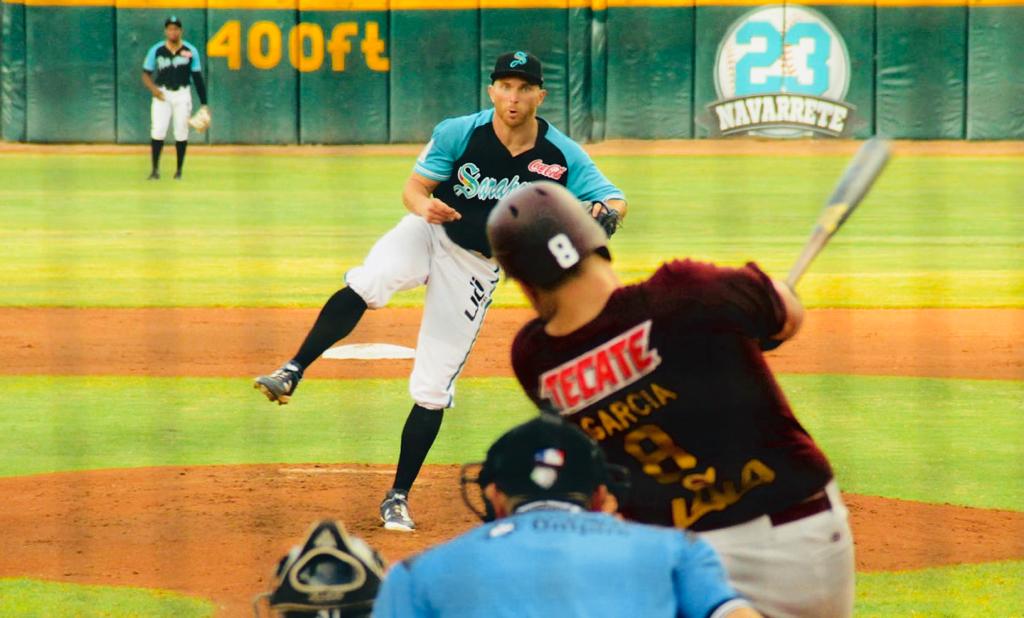
Arik Sikula releases a pitch in Liga Mexicana de Béisbol action
Jack Howell agrees. A seven-season major leaguer who found himself a free agent after the 1991 season, he went to Japan for four years, winning the most valuable player award after batting .331 with 38 home runs in his first season with Yakult and then helping lead the Swallows to the Japan Series championship in 1993. Playing in Japan revived his career, as he played four more seasons in the majors after returning.
“I played with Rex Hudler the year we won the championship,” he said. “We had a rainout one day, but the manager wanted us to work out. The turf was wet, and the temperature was rising, so there were worms around. I knew Rex had once eaten a beetle, so I picked up a worm and asked him to eat it. The guys got a pot of something like 35,000 Yen, and he ate the worm. Everyone was clapping, and we went on another winning streak. The Americans became a real part of the team then.
“I’d always heard that the guys who didn’t make it in Japan had been less flexible,” Howell continued. “So I did everything the others did, and I think that shocked them a bit. I did things their way, and it worked.”
And that advice doesn’t only apply to players and coaches. Shane Barclay spent a college semester studying in the Dominican Republic and two years there working for Major League Baseball. He now operates a baseball-themed travel company, JapanBall.
“I was curious about their culture, which helped,” Barclay said. “I’d stayed with a host family when I studied there, and that provided me with something of a foundation when I went back there with MLB. I lived in a regular part of the city, not a gated community for expats, and I took public transportation a lot, which got me some added credibility.”
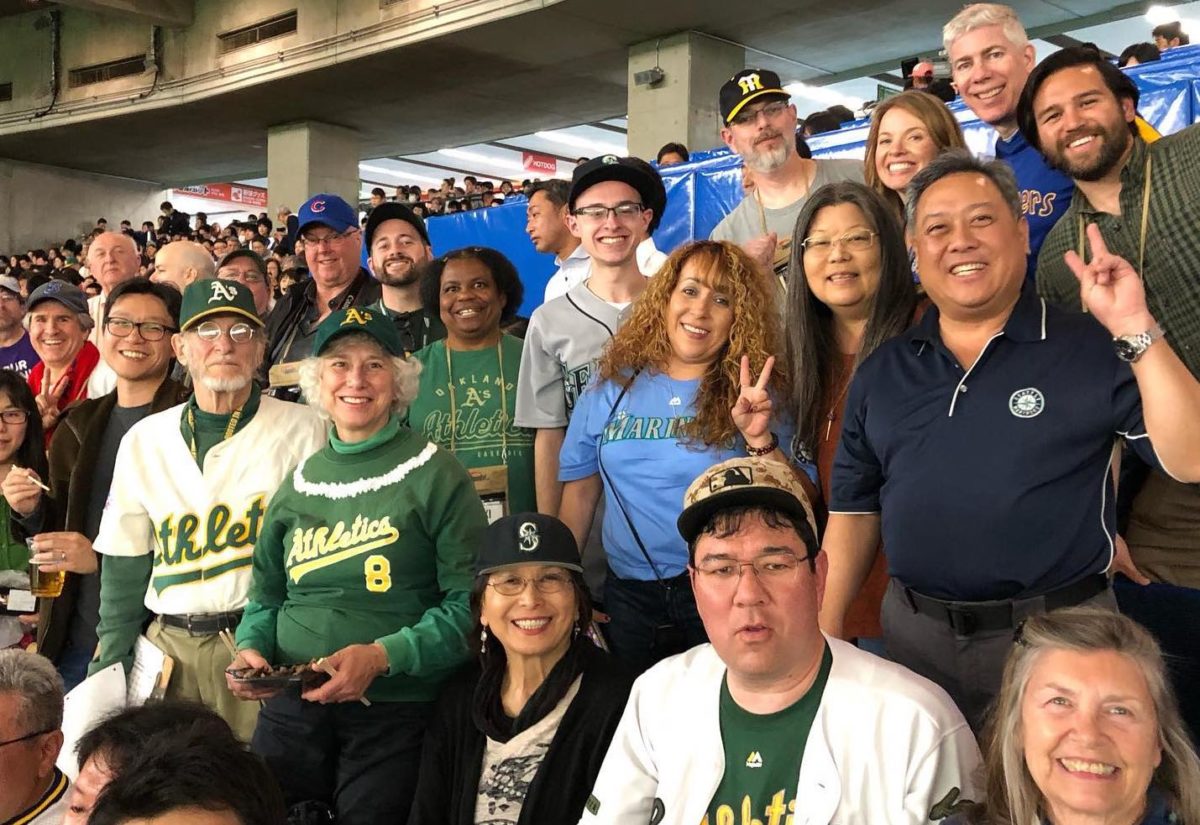
Shane Barclay (far right) with a JapanBall tour group.
All this is not to say that simply having an open mind will automatically smooth the bumps and fill the potholes in the road. Languages are different; prices are shown in the local currencies; signs are in the local languages, etc. It takes time to integrate, and situations can arise almost daily that range from the amusing to the scary.
- Howell: “Our interpreter was more from the countryside, so not all the words we learned from him were those you’d hear in the cities. My wife would always say a word for ‘toilet’ until we found out that it was considered a coarse slang word. From then on, we said ‘toilette’.”
- Barclay: “Once, I was going to cook a holiday meal for my host family. I was at the store and wasn’t sure if we had any penne pasta, so I called our housekeeper. She didn’t understand what I was saying – I think she thought I was saying something crude – so I had to come home and show her the bag to make her understand.”
- Sikula: “When I was in Venezuela in 2015, the team put us up at a resort, and we were warned not to leave the resort unless we were with a Venezuelan player. The beach and a mall were just across the street, and I wanted to go to the beach once on an off day. Luckily, I decided against it. The next day, I read in the paper that a couple of boats had stopped, robbed everyone on the beach and shot several people. I asked some people about it, and they just said, “Yeah, that can happen.”
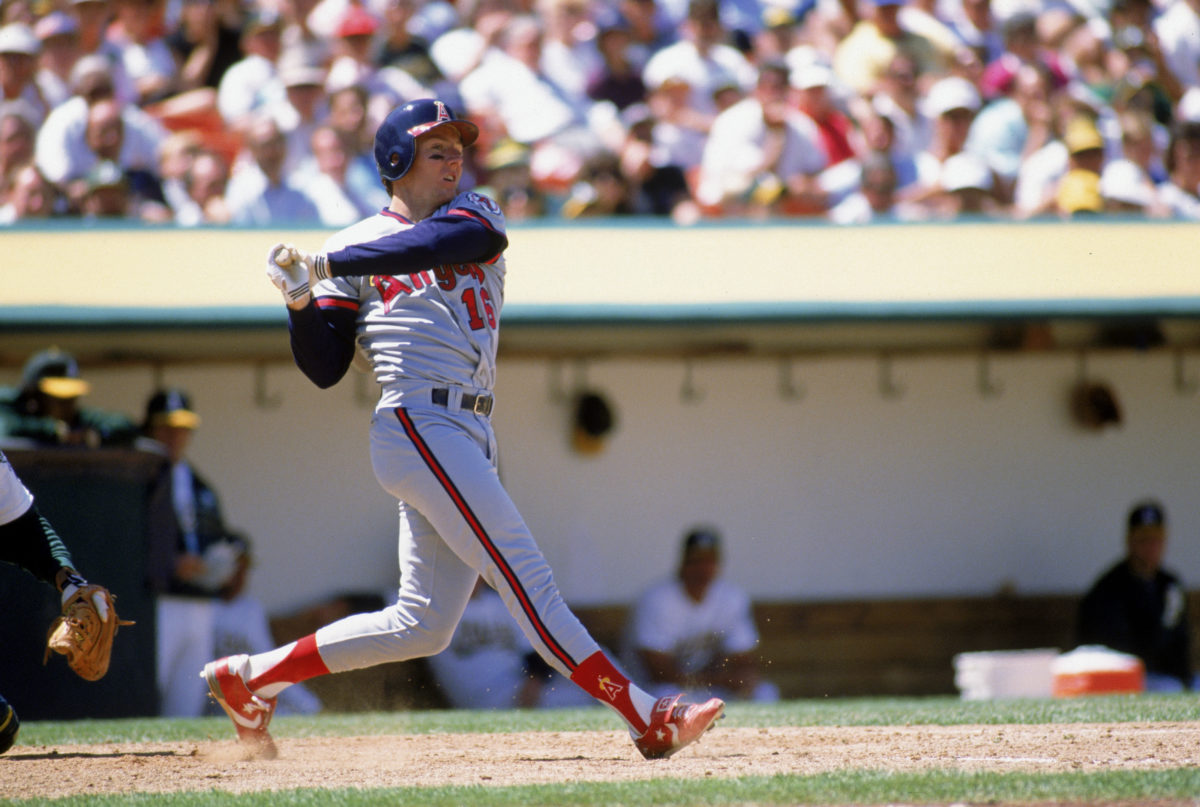
Jack Howell was the California Angels third baseman from 1985-1991
- Mark Weidemaier, bench coach in 2020 for the Kia Tigers of the Korean league: “On bus trips in Mexico, we’d go through towns and see young boys 8-9 years old holding burning sticks into which they would spit gasoline to create bigger flames. People would toss money at them. It was like a sideshow.”
- Kevin Beirne, who pitched four seasons in Japan: “Our Venezuelan players told us they had armed guards with German shepherds by the dugouts in their games. If someone ran onto the field, they’d let the dogs go – So no one ran onto the field!”
- Sikula: “I was playing winter ball in Colombia, where motorcycles are often used as taxis, and I took one to the ballpark one day. I had my uniform on with my bag over my shoulder and was on the back of the scooter. This guy was weaving in and out of traffic, breaking every driving rule there was, and I was hanging on for dear life. My heart was really racing. But what an experience to look back on now.”
- Scotty Mulhearn, an Australian who has played for independent teams in multiple countries and now lives in Prague: “You get different sides of historical matters than what you were taught. I see the most difference in grocery stores. Everything is in the local language and currency, so what would take me 20 minutes at home might take an hour here.”

Scotty Mulhearn, player-coach for Kotlarka Praha of the Czech Extraliga
The media and fans add to the experience, too. In Japan, for example, the media can be difficult, a notorious example being that of Randy Bass, who batted .337 over six seasons for the Hanshin Tigers, won two triple crowns and one year hit 54 home runs. But when he returned to the U.S. after his son was diagnosed with brain cancer, the media vilified him and the team released him, though he later proved that the Tigers had authorized a leave of absence.
Howell never experienced anything like that, but he noted that “when we lost, it was because we weren’t playing as a team. When we won, it was because we were learning how to play as a team. That was kind of irritating. Certainly, there is some truth to the concept of team play, but baseball is a team game played by individuals.”
Speaking with the media through an interpreter can be interesting, as well.
“I’d give a long answer to a question, and the interpreter might give a very short response to the media person,” Beirne said. “I’d ask the interpreter what he said, and he’d just say ‘I told him you agreed with him.’ That was odd.”
Mirabal concurred, adding that “I was always giving the same answers to the same questions, so my interpreter started answering for me. Occasionally, a reporter would ask me about a quote of mine from several days before, and I wouldn’t know what he was talking about.”
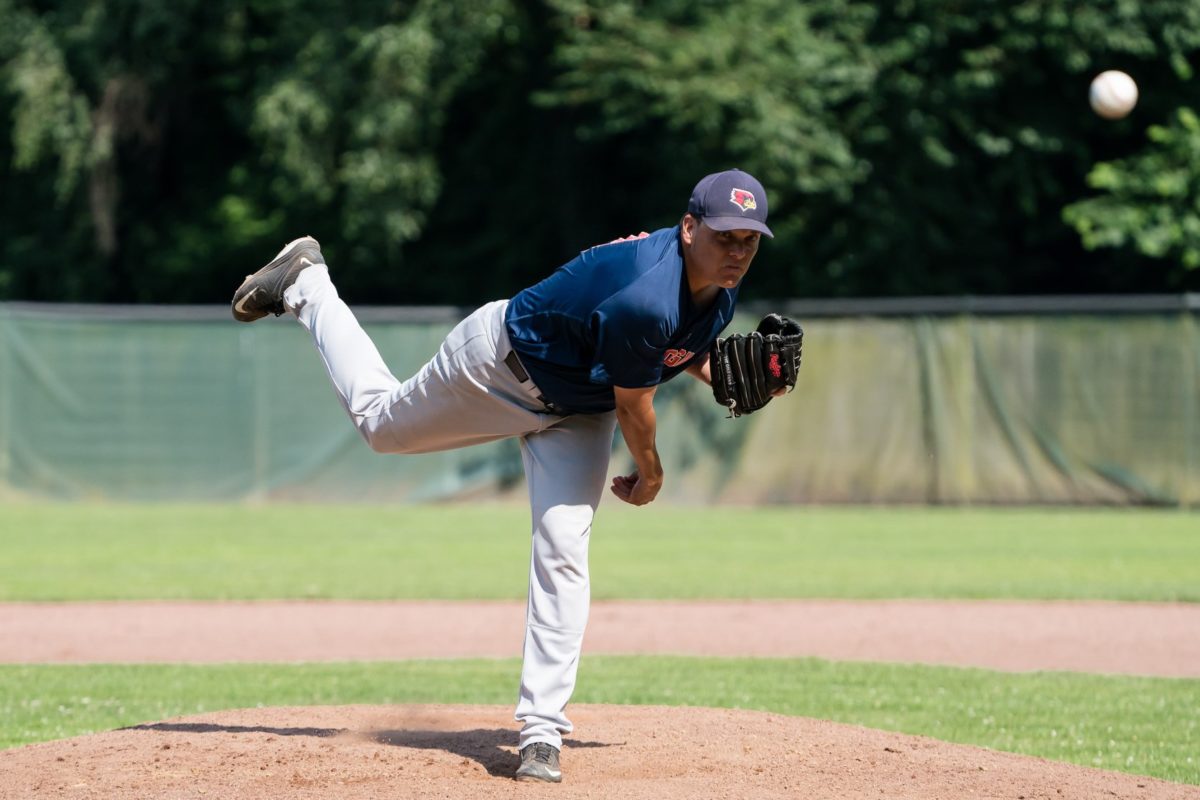
At the age of 44, Carlos Mirabal pitched in the German Bundesliga.
The fans can often be passionate … sometimes to the extreme. Japanese fans make a lot of noise, and the cheering sections are “on” the entire game, though everything is very orchestrated. Latin American fans, on the other hand, are much more spontaneous. It’s not unusual to see fans forming conga lines and moving through the stands.
-
Weidemaier: In Venezuela, fans would throw their cups of beer into the air when a player for the home team hit a home run, thereby giving nearby fans impromptu showers. And it wasn’t always just beer – “Instead of going to the men’s room, the guys sometimes would relieve themselves in their cups.”
-
Beirne: “The fans in Japan were louder than in any ballpark in the U.S.”
-
Brazell: “My son was born while I was there, and I hit two home runs that day. I still get messages from some fans wishing him a happy birthday.”
-
Scott Mathieson, a reliever for eight seasons with the Yomiuri (Tokyo) Giants, said, “I still get messages on social media from some fans. Once after a game, I was with my wife and a teammate with some fans nearby. I mentioned to a young girl that her dress was pretty and introduced her to my teammate. Later, her father contacted me and thanked me. Apparently, his daughter had had some real problems with depression, but he said meeting us made a real difference for her.”
Even the game itself differs from country to country. Latin American players, for example, often play with a certain joie de vivre sometimes absent in other parts of the world. Hitters take a lot of time getting into the batter’s box, let the walk-up music play, and often speak with other players and fans as they approach the plate. And, of course, bat flips are common and accepted.

Scott Mathieson with the Yomiuri Giants
The Asian game is known as being more fundamental. There are a lot more “by-the-book” moves by managers, and small-ball is predominant. Pitchers throw far more pitches between games, and they rely more on breaking pitches than in the U.S. Hitters tend to be more disciplined and focused.
-
Mulhearn: “It was a shock to me how much they bunted in Japan. The three- or four-hole batter would sometimes bunt – even with no outs and a runner on first base.”
-
Brazell: “I saw guys actually practice hitting foul balls. I did it the first day and wondered what the heck I was doing. But it made me a better hitter in the long run.”
-
Beirne: “The mounds are a little flatter in Japan, and the balls are a little smaller and not wound quite as tightly. The hitters are very good at fouling off pitches and also do a lot more soft-toss and batting practice than we do in the States. It’s all about practice, practice, practice. Once, (Daisuke) Matsuzaka threw a 365-pitch bullpen session. I said, “What????!!!”
-
Sikula: “Four-hour games are common in Latin America, and many are longer, because pitching matchups often start in the fourth and fifth inning. Also, hitters want the crowd to know who is coming up to bat, so they take a lot of practice swings and take their time getting into the batter’s box.”
Mulhearn added, “The style, or mentality, in Japan is almost like being in the military – very strict and rigid. There are no excuses for being late or having a dirty uniform. Everyone is very vocal – always yelling and chanting when running. Then again, they’re really good players, so there’s something positive about their approach.”
Pitchers sometimes have had trouble getting used to the additional workloads, but Beirne and Mathieson adapted to what was a new routine for them and made it work.
Beirne, who bought a car in Japan and learned to drive on the opposite of the road, said, “We threw a lot between starts, but I didn’t have as many injuries because I got used to throwing. They do a lot of massage and acupuncture, which helps you recover more quickly.”
Mathieson added, “I threw a bullpen session every day, and I got used to it. My arm felt great, and it still does. Actually, you had the option of doing your own training regimen or theirs – but if you do it their way, you’ll tend to last longer there.”
Not ready to hang them up? Seeking a new career path?
Annually our members sign over 300 contracts overseas. There are a variety of levels overseas which present opportunities for players and coaches, both aspiring and established professionals.




 Moonshot is a baseball apparel company based out of Mannheim, Germany, and is owned and operated by a good friend of ours, Juan Martin. What separates Moonshot from the other companies we have used in the past, is the value for your money and the customer service. You will not find prices like this in Europe or someone that responds faster.
Moonshot is a baseball apparel company based out of Mannheim, Germany, and is owned and operated by a good friend of ours, Juan Martin. What separates Moonshot from the other companies we have used in the past, is the value for your money and the customer service. You will not find prices like this in Europe or someone that responds faster. 
 High end, professional wood and composite bats with a wide selection of models using many different types of wood from Japan, North American and Taiwan. Hakusoh Bat is approved with the WBSC and across Europe.
High end, professional wood and composite bats with a wide selection of models using many different types of wood from Japan, North American and Taiwan. Hakusoh Bat is approved with the WBSC and across Europe. 




